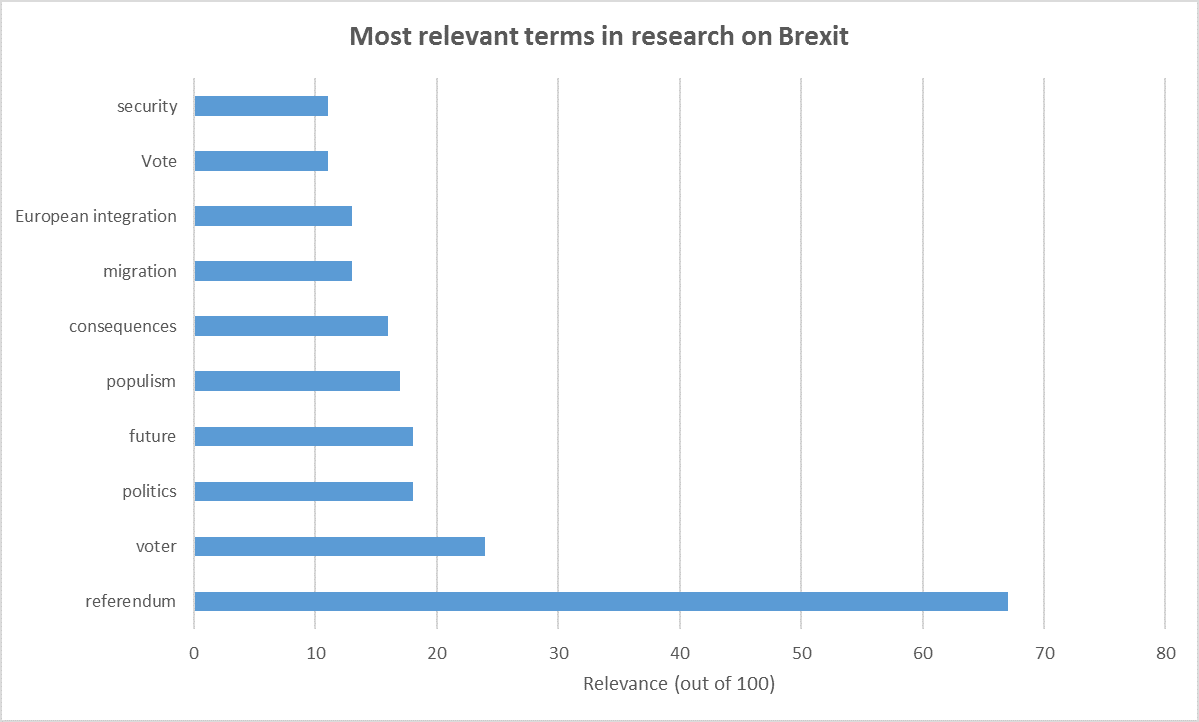Although there isn’t really a day at the moment when Brexit is not topping the news agenda in the UK, the topic has reached new heights of domination around fears the negotiations with the European Union are stalling.
But is Brexit consuming academic researchers' time in the same way it is occupying political journalists? And which universities are producing the most research on the debate?
According to Elsevier’s Scopus database, the London School of Economics has produced the most scholarship featuring “Brexit” as a keyphrase, with 34 pieces of research published up to this year, followed by King’s College London with 28.
Top 10 universities for Brexit research to 2017, by output
| Institution | Scholarly output | Field-weighted citation impact |
| London School of Economics | 34 | 2.1 |
| King's College London | 28 | 1.89 |
| University of Oxford | 24 | 3.56 |
| University of Cambridge | 23 | 2.21 |
| University College London | 17 | 1.4 |
| University of Edinburgh | 15 | 0.92 |
| University of Manchester | 13 | 5.5 |
| University of Warwick | 12 | 0.51 |
| Cardiff University | 11 | 2.23 |
| University of Sheffield | 11 | 1.71 |
Source: Elsevier/Scopus
However, measured by field-weighted citation impact – a measure of how often research is cited, normalised for subject area and year – the University of Oxford is top among the institutions with the highest output.
The most cited single piece of research, according to the data, is a paper published in Political Quarterly just days after the referendum entitled "The 2016 Referendum, Brexit and the Left Behind: An Aggregate-level Analysis of the Result" by Matthew Goodwin, professor of politics at the University of Kent and Oliver Heath, professor of politics at Royal Holloway, University of London.
Other highly cited papers include one by Sara Hobolt, Sutherland chair in European institutions at LSE’s European Institute, and another by Danny Dorling, Halford Mackinder professor of geography at Oxford.
Meanwhile, a keyphrase analysis of research on Brexit gives a flavour of the kind of issues that have become central to the debate so far. Once terms such as EU, Europe or Britain are excluded, “referendum” is unsurprisingly the most frequently occurring but “populism”, “consequences” and “migration” also make the top 10.

Find out more about THE DataPoints
THE DataPoints is designed with the forward-looking and growth-minded institution in view
Register to continue
Why register?
- Registration is free and only takes a moment
- Once registered, you can read 3 articles a month
- Sign up for our newsletter
Subscribe
Or subscribe for unlimited access to:
- Unlimited access to news, views, insights & reviews
- Digital editions
- Digital access to THE’s university and college rankings analysis
Already registered or a current subscriber? Login





